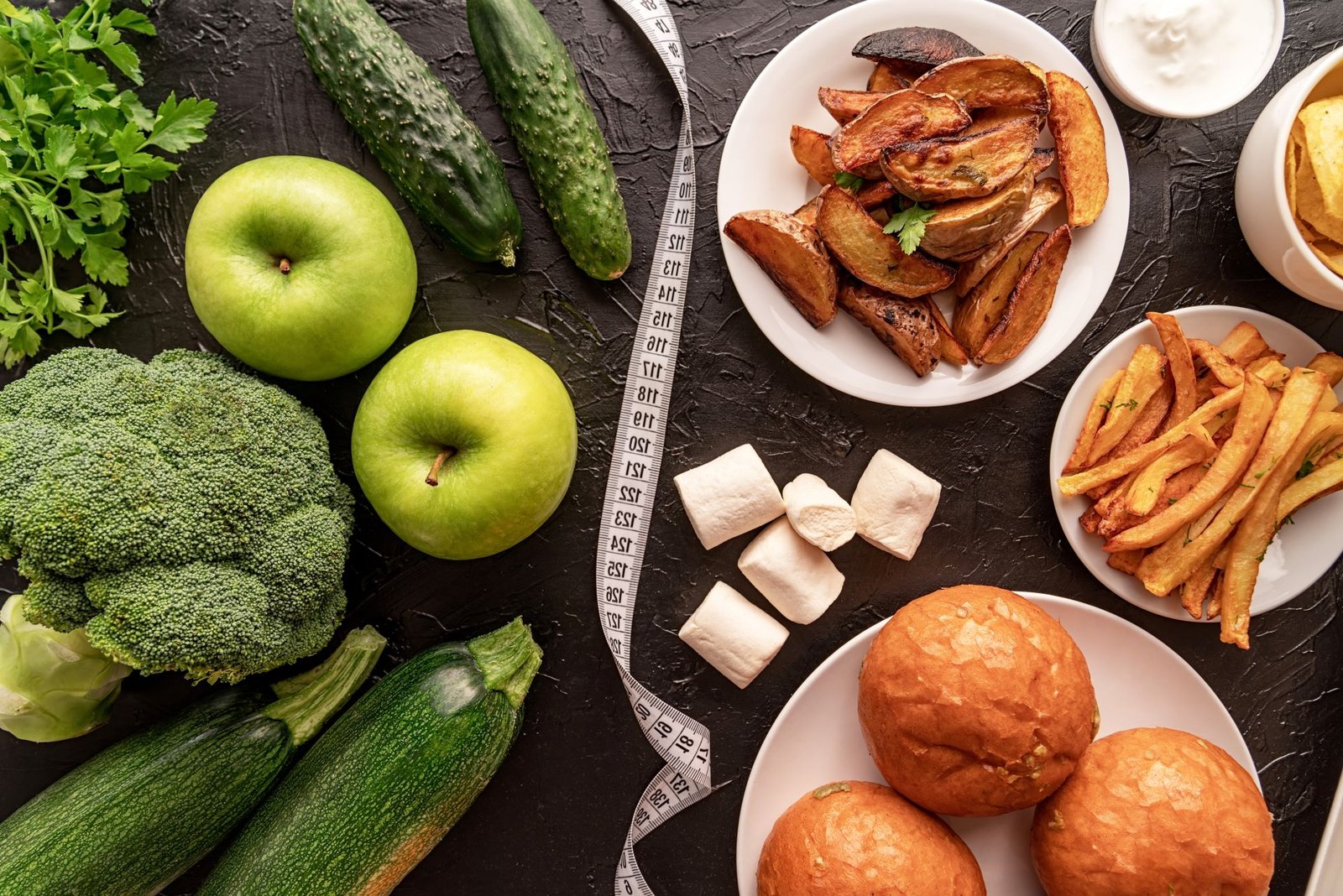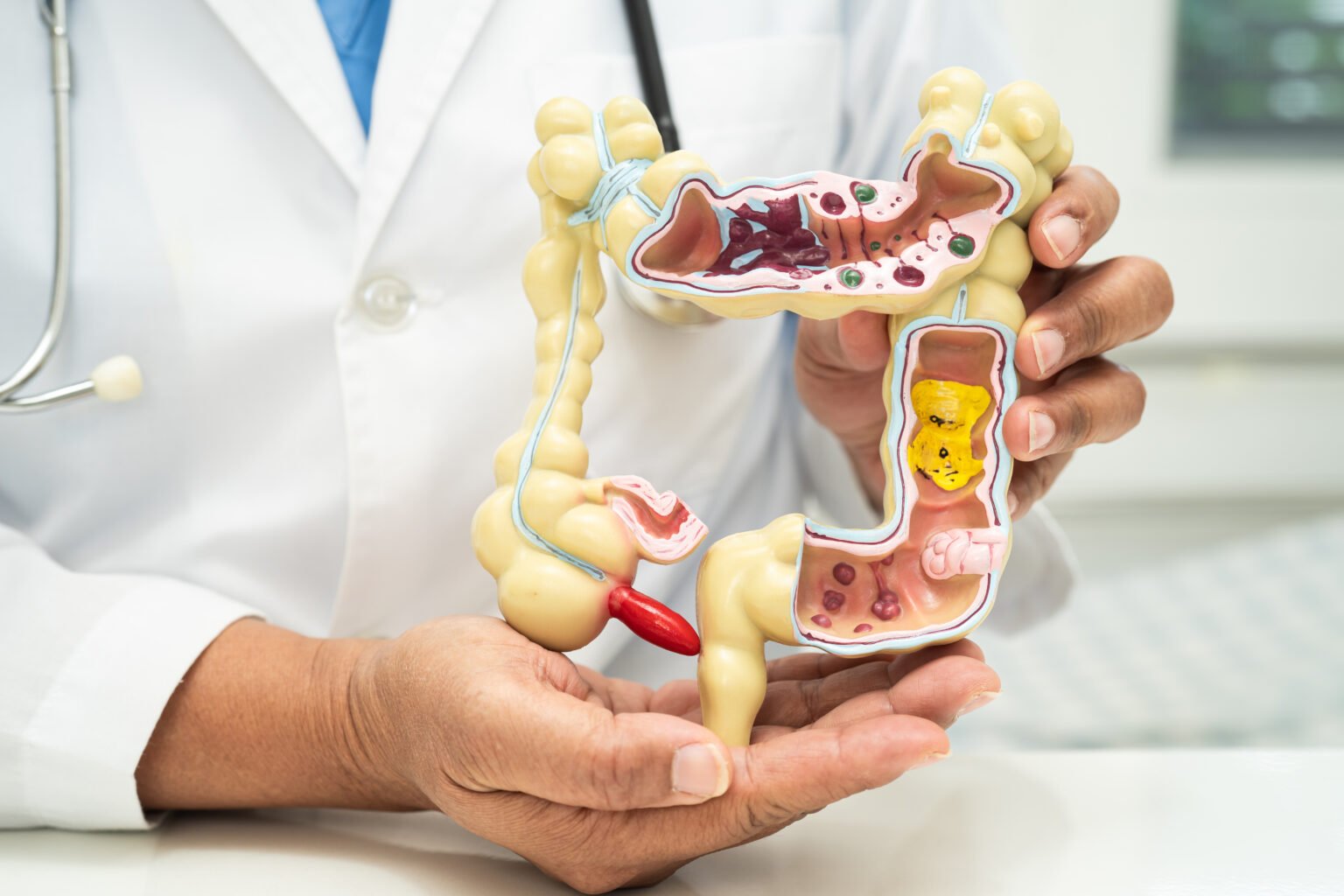Colorectal cancer is the third most common cancer worldwide accounting for approximately 10% of all cancer cases and it is second leading cause of cancer-related deaths worldwide. so let see what is diet in colon cancer ?
What is colorectal cancer?
Cancer means when cells in our body begin to grow in uncontrolled manner (spreads or remain confined to that part) and destroy body tissues. It can start almost anywhere from any organ to any tissue.
Colon cancer is the cancer that develops in the tissues of the colon and rectal cancer is the cancer that develops in the tissues of rectum. Colon and rectum make up the large intestine which is a part of your digestive system also called the gastrointestinal system. Colon and rectal cancers are often grouped together because they have many features in common.
Colorectal cancer often begins as a growth called as polyp (a benign or non-cancerous growth) on the lining of the colon or rectum.
Regular screening tests are required to detect precancerous polyps before they can become cancerous tumors. Finding and removing polyps helps prevent colon cancer.
Symptoms of colorectal cancer
The symptoms of colorectal cancer depends on the location of the cancer, its size, how advanced it is and how it affects nearby organs and tissues.
Many people will not have any symptoms in the early stages of the disease. It may include-
- Change in bowel habits that lasts more than few days.
- Diarrhea.
- Constipation
- Abdominal pain.
- Bowel does not empty completely.
- Your stool is narrower or has a different shape than usual.
- Blood in the stool
- Frequent gases, bloating, fullness and cramps.
- Unexplained weight loss.
- Anemia
- Vomiting
- Fatigue
Types of colorectal cancer:
1. Adenocarcinoma – The most common type of colorectal cancer. They make up about 95 percent of all colorectal cancers. It starts in those cells of colon that produces mucus (glandular cells) to lubricate the inner lining of colon or rectum.
2. Carcinoid tumors – These tumors start in hormone producing cells of large intestine. They usually don’t cause symptoms, but can cause pain, bleeding and constipation in the rectum.
3. Gastrointestinal stromal tumors – These tumors start in the nerve cells of gastro-intestinal tract. They usually start as noncancerous but turn into cancerous later on.
4. Lymphoma – This type of colorectal cancer starts in the lymph nodes in the colon which are part of the immune system.
5. Sarcomas – These tumors start in the blood vessels, muscle layers or other connective tissues of colon or rectum. These are rarely seen.
Cause of colorectal cancer:
There aren’t certain causes but some theory is believed to be causing most colon cancers.
Colon cancer happens when cells in the colon develop changes in their DNA. A cell’s DNA holds the instructions that tell the cell what to do. The changes tells the cell to multiply quickly. The changes let the cells continue living when healthy cells die as part of their natural lifecycle.
Diagnosis
- Stool DNA test.
- Sigmoidoscopy
- Barium enema x-ray
- CT Colonography
- Imaging scans.
Lifestyle changes to reduce the risk of colon cancer:
- A diet that is rich in fiber, fruits, vegetables and whole grains followed by regular exercises is highly recommended to reduce the risk of colorectal cancer. Quitting habits like drinking alcohol and smoking tobacco.
- Maintain a healthy weight.
- Regular screenings are crucial for early detection.
- Drink alcohol in moderation if at all.
- Regular intake of prescribed medications
Role of diet in colorectal cancer ?
As mentioned above colorectal cancer might be linked with a typical pattern of diet. Researchers have identified certain food substances that causes inflammation in the body contributes to an increased risk of colorectal cancer. The type of diet that tends to be low in fiber and high in fat and calories. Some studies have found an increased risk of colon cancer in people who eat lot of red meat and processed meat.
Also, obesity is one of the prominent risk factor. Obesity doesn’t happen overnight. It gradually develops over a time as a result of poor diet and lifestyle choices such as eating large amounts of processed or fast foods that are high in fat and sugar. When we consume extra calories regularly and do not use this energy through physical activity, much of it gets stored as body fat.
Taking into consideration all of the above risk factors it will be utmost important to focus on specific diet pattern to reduce the risk and rate of recovery of colorectal cancers.
Do’s and Don’ts in colorectal cancer:
| Do’s | Don’ts |
| Whole grains | Processed foods |
| Variety of fruits and vegetables | Processed meat |
| High fibre foods | Red meat |
| Healthy fats | Fried foods |
| High protein foods | Sugary beverages |
| Legumes | Trans fats |
| Green leafy vegetables | Alcohol consumption |
| Water | Smoking |
Eating a well-balanced diet before, during and after cancer treatment can help you feel better, maintain your strength, maintain healthy weight and speed your recovery.
To maintain a healthy colon, it is important to limit and avoid certain foods that negatively affects digestion and contributes to obesity
If you have specific dietary concerns or conditions, consult with cancer dietician Dr Harshala Bade to address to your personal needs.

1. Maintain a healthy weight: Treatments such as chemotherapy, radiation, and surgery for colorectal cancer can often contribute to unintentional weight loss. It is important to avoid excess weight loss during treatment as poor nutrition status can cause decrease the body’s ability to fight infection.
2. Include whole grains: Whole grain food provides a good amount of carbohydrates and fiber which helps in keeping energy levels up. Do not include too much fiber as it will increase stool output. Whole grains are that grains which have all three parts like endosperm, kernel and bran intact, however refined grains are one that retain only endosperm and other two parts are removed which makes them less nutritious and low in fiber. Choose whole grains like rice, brown rice, wheat, barley, oats, millets, red rice, buckwheat, quinoa, amaranth over refined grains like all-purpose flour, corn grits, white bread. Choose at least one year old grains over newest variety and polished ones. Choose lentils, red beans, green peas. chickpeas and black beans. These foods are high in fiber and specific micronutrients along with macronutrients.
3. Eat a variety of fruits and vegetables everyday: Variety of foods and vegetables provides lot of vitamins, minerals and antioxidants which can help fight cancer. Aim to minimum 3-4 servings of whole fruits and vegetables per day.
4. Choose protein rich foods: Protein helps body to repair muscle and tissues. Lentils and beans are good plant based protein sources. Include a source of lean protein in every meal. Good sources of lean protein are- chicken, fish, eggs, low-fat dairy products, beans, soy foods and nuts.
5.Choose healthy fats: Avoid deep fried, greasy and fatty foods. Choose baked, boiled, shallow fried, grilled, sauted foods instead. Healthy fats include a combination of MUFA and PUFA oils like olive oil, sunflower oil, rice bran oil, coconut oil, mustard oil, soyabean oil, groundnut oil, nuts, ghee etc.
Limit use of saturated fats like ghee, coconut oil, condensed milk, butter, whipped cream, ice-cream, poultry skin, chicken. Choose mainly unsaturated fats.
Avoid palm oil, vanaspati ghee, dalda, margarine, mayonnaise, butters, lard, creams, full-fat dairy products, red meat, pork, beef, lamb meat.
Avoid foods high in trans fats like Hydrogenated vegetable oils, fast food, deep fried street food, bakery items like cakes, pastries, chocolates.
6. Include food rich in folic acid and Vitamin B:
Sources of Folic acid:
a. Green leafy vegetables like spinach, kale and mustard green.
b.Brussels sprouts.
c. Broccoli
d. Citrus fruits like oranges.
e. Beans and peas like chickpeas. Kidney beans and black eyed beans.
f. Nuts and seeds
g. Beef liver chicken liver sea food
h. Wheat bran and whole grain foods.
Sources of vitamin B 12:- Animal products: Fish, meat, poultry, eggs, milk and other dairy products like milk, cheese, paneer, yoghurt.
- Bananas, blueberries, guavas, kiwis, oranges, mulberries, blackberries, pomegranates.
- Fortified foods like cereals.
- Almonds
- Stop smoking: Talk to your health care team about ways to quit.
- Exercise most days a week: Try to get at least 30 minutes of exercise on most days. If you have been inactive, start slowly and build up gradually to 30 mins. Learn different forms of exercises from an experienced coach.
- Plant based food: Polyphenols, a type of compound found in many plant foods have been linked to reduce the risk of colon cancer.
Diet during and after Colon Cancer surgery:
Follow your surgeon’s instructions very carefully before your surgery. It is very important to follow these to minimize any complications.
Give your colon adequate time to heal and to slowly transit from liquid diet to solid diet.
At the time of hospitalization your hospital medical team will guide you and after discharge you can contact our team to help you go smoothly through the transition to a regular diet.
Start with clear liquids (without pulp) and then slowly start with semisolid foods. Timely keep a check on digestive capacity, urine and stool output. Introduce food slowly one at a time and in small portions. Do not eat too much and too many food items at a time. After introduction of every new food item wait for 1-2 hours to see how your body digests and reacts. Choose foods that are available locally as per your region and religion. Do not go for any fancy food item that your gut may not tolerate. Food tolerance will not be same for all.
Avoid raw vegetable and fruit juice with pulp. Dairy products such as milk and foods made with milk may cause nausea or increase nausea. Avoid these foods if you are not tolerating them well.
Avoid nuts, seeds, dried fruits, coconut, hard coarse cereals, and high fiber cereals like bran, barley, granola, dry food items, raw vegetables, crisp deep fried foods, fruits or vegetables with tough and fibrous skin with seeds.
Talk to your healthcare team before taking any vitamins or supplements. Choose food over supplements for nutrition.
Most importantly is that your cancer journey is unique to you and your treatment:
You may experience side effects that affect your ability to follow these suggestions. If you are struggling with any side effects such as loss of appetite, nausea, vomiting, or any other nutrition concerns your needs may be different. A cancer dietician can suggest nutrition guidelines that will be appropriate for your cancer journey.
About Team ‘Cancer In Ayurveda’
Team ‘Cancer In Ayurveda’ comprises of group of researchers and practitioners who have come together for the larger benefit of the society. Team ‘Cancer In Ayurveda’ is deeply and sincerely involved into researching potential benefit and developing different modalities in treatment of cancer through Ayurveda. Team ‘Cancer In Ayurveda’ is striving to fulfill the long lived dream of offering personalized ‘Ayurveda Cancer Care’ to an individual.
Team ‘Cancer In Ayurveda’ emphasizes over the principles of management of cancer through ayurveda which are by evaluating the root cause of the cancer, enhancing the immunity, and the most important of all improving the quality of life of the cancer patients. Team ‘Cancer In Ayurveda’ also idealizes over the principles of developing customized diet and lifestyle chart for the cancer patients to further increase the affectivity of the treatment.

